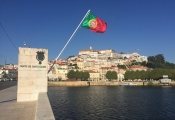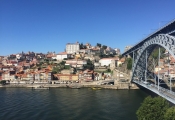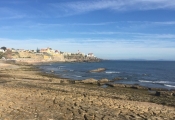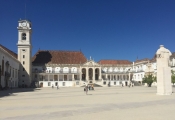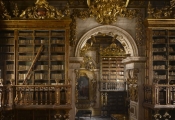Impressions from the 4th International conference “Digital resources for science and education – development, promotion and usage” 24 – 30 September 2016, Estoril (Portugal)
31.10.2016
The conference was organized by the Nonprofit Partnership “National Electronic and Information Consortium” (NPP “NEICON”) supported by the Ministry of education and science of the Russian Federation. 124 delegates attended the event, among whom there were representatives of academic libraries, foreign and national publishers, promoters of digital resources, representatives of State agencies and all those who had found themselves interested in raising quality of education in Russia, of Russian science, and quality of scientific publications; those who found important the system of scientific periodicals in Russia to be developed and to broaden their presence in world scientific and information environment.
The first theme to be dealt with was management of scientific research. As expertise was one of its principal aspects, the conference was opened by Andrey Nikolayevich Petrov (FSFIS “Direction of STP”, director general) and his speech “Information support of expert activity”. Yakov Leonidovich Shraiberg (RNPLST, director) emphasized that the volume of data received by libraries by that moment was immense. It would turn into “big data” and needed specific research methods to be processed.
In order to contribute to the direct communication of the participants of the conference with the heads of the branch, there was held a roundtable discussion “Questions and Answers. Prospects of Infrastructure of Russian Science and Information Support of Scientific Research”. The discussion turned out to be hot and long. The initiative of universities and their staff was under the question. The participants sitting among the audience claimed their initiative would find no support by the administration, and the decisions would be made without them. Still the administration board retorted that the initiatives and opinions would find more support in case they were formulated more clearly. As a result all the participants of the discussion seemed to remain unconvinced despite numerous examples and expressive speeches from the both parties.
Another theme defined as important was information support of scientific research. Here matters of support of Russian information journals were dealt with, there was illustrated state of affairs with subscription and usage of research information in Russia and in the world, there was carried out analysis of surveys results and made prognoses for the future. Apart from that there were discussed questions of creation of the map of subscription in Russia and of its potential benefits. Olga Vladimirovna Kirillova, head of the project of support of Russian research journals, reported on the results of the three – year workflows. Within the framework of the project there had been carried out contest of journal development with 536 participant journals. 30 winner journals received financial support (90 million roubles for three – year term), there was created Russian expert council on evaluation and promotion of journals into international information systems and “Association of research editors and publishers”. There were held seminars, webinars, two conferences, etc. In the end from the 12 journals which had not been included into citation indexes in the beginning, 8 were accepted into Scopus, 1 – into ESCI, 3 addressed their requests to Scopus, 2 were still doing that. From the 18 journals participant of WoS and/or Scopus, 11 ones raised their scores. Besides, the participants of the conference were happy to learn that there was planned continuation of federal target programme “Research and products in priority directions of scientific and technology complex of Russia for 2014-2020” and, consequently, of programmes of development of scientific journals in order to make them enter international scientometric databases.
Evgeniy Nikolayevich Strukov (Kazan Federal University) and his speech about the role of academic library in project “5/100” (http://conf.neicon.ru/materials/22-Overseas2016/20160926-13-Strukov.pptx) was a success with the audience. The report covered all the directions of work of the academic library supporting research and educational activity at that large university. That work would be also found interesting and multi – sided – from organization of the common point of access to all the resources of the library (with its collections, DLS, international network resources, etc.) to scientometrics, monitoring, publishing and author’s consulting.
Sergey Paramonov gave the overall survey on Russian science through the prism of Web of Science http://conf.neicon.ru/materials/22-Overseas2016/20160926-15-Paramonov.pdf. As Web of Science reported, Russia had achieved the scores of only 2.0 (instead of 2.44). Still since the year of 2012, the increase of amount of Russian publications had been obvious, and, perhaps, the following conferences would witness the reach of the sacred figures.
The second day of the conference was devoted to the place of academic library in the modern conditions. The compere of the section Ekaterina Mikhailovna Polnikova pointed out at the advancement of search capabilities and presented concept of the website of the library of St. Petersburg University in the style of Ben – Tou as the most important aspect in library work http://conf.neicon.ru/materials/22-Overseas2016/20160927-04-Polnikova.pdf. From simple resource enumeration, St. Petersburg University had transferred to the common search point, and the special attention was given to the information concerning open – access resources, free services, descriptions of available resources, author’s advising. The plans for the future included development of a search interface styled as Ben – Tou where there would be created an additional kind of search among the information systems of the organization, the search results would be given on one page, there would be constructed separate blocks for each information source, and there would be possible to view main information on the document in screentips and to transfer to the document itself.
Influenced by the lively discussion of the previous day, Mikhail Olegovich Shepel (Tomsk State University) who had intended to speak about network projects of university libraries changed the subject of his speech into “Answering the question of ‘initiative from the bottom’, or network cooperation of university libraries” http://conf.neicon.ru/materials/22-Overseas2016/20160927-06-Shepel.pptx. He emphasized the absence of the principle model of the library of the university of the future, and of the consolidated policy concerning university libraries. There did not exist either the set directions of priority in the development of university libraries, or modern key indicators of statistics and efficiency, or approximate regulations for libraries of higher education institutions of different types, or even coordination in resource subscription. As a possible solution to the problem the speaker offered to create new associations oriented on project work, to use new formats of work for the library community (transition from conferences to strategic session meetings) and to support initiative projects of university libraries.
The second half of the second day of the conference witnessed changes of its programme. There had been planned two parallel events, “Time of APUSEDR" (discussion spot of the Association of producers and users of educational digital resources) and roundtable discussion “State of affairs and prospects of the RNPLST projects within the framework of the Federal strategic programme of the Ministry of education and science”, and all the participants of the conference were willing to attend the both of them. So, by shortening time limits for speeches, the events were made consequent, and the step turned out to be right. The both events were popular with the public to the utmost degree. At the discussion spot of the Association of producers and users of educational digital resources there were presented speeches by the delegates of Russian Digital Library Systems (Lan, Direct – Media, INFRA – M, etc.). The speeches were devoted to the capabilities of their systems and DLS users, and to users’ expectations connected with DLS, as well as to their needs and demands. According to the survey presented by Svetlana Alexandrovna Morozova (the Herzen State Pedagogical University of Russia) in “DLS searching – users’ opinion” http://conf.neicon.ru/materials/22-Overseas2016/20160927-16-Morozova.pptx, the majority of users needed the common point of access to all the resources, this including DLS. In that respect the speech by Evgeniy Nikolayevich Strukov (Kazan Federal University) about the experience of launching the common point of access to APUSEDR resources was no less interesting http://conf.neicon.ru/materials/22-Overseas2016/20160927-15-Strukov.pptx. By that time, there had been completed the processes of collecting metadata of participant DLS, of forming central index and developing the entry consolidation module. The main problems were connected with different approaches in resource description practised by different DLS. Thus in the nearest future there was planned the development of a consolidated standard of description and realization of the selector work directly at the platform of the system.
The roundtable discussion “State of affairs and prospects of the RNPLST projects within the framework of the Federal strategic programme of the Ministry of education and science” gathered a lot of participants. The matters described in the speeches of the RNPLST representatives, in “RNPLST as operator of information and analytical system “Map of Russian Science” and Digital Catalogue of the Sphere of Education and Science” by Mikhail Vladimirovich Goncharov and “National Subscription 2016 – Dynamics” by Elena Vladimirovna Marinosyan, turned out to be of pure interest and real concern for the audience. The participants of the conference revealed their anxiety about the quality of information on the Map of Science, as well as about its prospects.
A separate section of the conference was devoted to the reports on diverse information resources. The speech by Nina Vladimirovna Avdeeva concerning the development of the referent document collection of quality on the basis of the Digital Dissertation Library of the RSL http://conf.neicon.ru/materials/22-Overseas2016/20160928-02-Avdeeva.pptx was met with enthusiasm. Everyone was impressed by the work over promotion of the resource and the amount of its users. The questions came how official the criteria of document evaluation were, and whether there existed coordination of the activity of the RSL and other Russian organizations collecting data on dissertation theses. Apart from that there were reports about Royal Society of Chemistry, John Wiley & Sons, Sage Publications, Cambridge University Press and a number of other publishing enterprises.
In continuation of O.V.Kirillova’s report (from the first day of the conference) there was organized a special section named “Russian journals and Russian publications” where there were discussed matters of quality of Russian research journals, methods of their evaluation and prospects. Among the speeches heard, there ought to be mentioned the report by Alexander Yuliyevich Kostinsky (head of the Administrative department of expertise, National Research University Higher School of Economics) “Academic expertise at NRU HSE – principles, role and mechanisms of evaluation of journals and articles in this process” http://conf.neicon.ru/materials/22-Overseas2016/20160928-15-Kostinsky.ppt. The role of expertise of the publications of the staff of the NRU HSE was really considerable, for they were paid premiums, and the amount of money depended directly on the number of publications and their quality. The report described in details the technological process and how a comparatively small team (3 officers of expertise were responsible for realization and 2 heads were supervising the process) would check approximately 7,300 articles within 1.5-2 – month time.
The final day of the conference took place at the University of Coimbra, which had been founded in 1290 and was considered one of the oldest universities not only of Portugal, but of the whole Europe. The university could boast of an oldest and richest academic library at the European territory, and the participants of the conference were lucky to visit it. That day the speeches of the conference were devoted to the matters of open access. In spite of the fact that the questions had long ago been formed, the principles of open access would not be comprehended by popular mass. The speakers discoursed about “temptations” of the open access (K.N.Kostiuk), problems of double financing in hybrid open access (I.K.Razoumova), about probable business model of open access journals (D.A.Semiakin), and about methods of evaluation for journals addressed to DOAJ. As guests of honour there were met the representatives of the library of the university of Coimbra Jose Augusto Bernardo and Anna Maria Eva Migueis, who spoke about technical aspects of library work at the University of Coimbra.
Within the framework of the conference there were organized master classes in scientometric tools and in academic writing by Thomson Reuters company.
The programme and presentations prepared by the participants of the “NEICON 2016” conference are available on the official website over here: http://conf.neicon.ru/index.php/science/overseas2016/schedConf/program.


 Virtual Keyboard
Virtual Keyboard
 по-русски
по-русски

